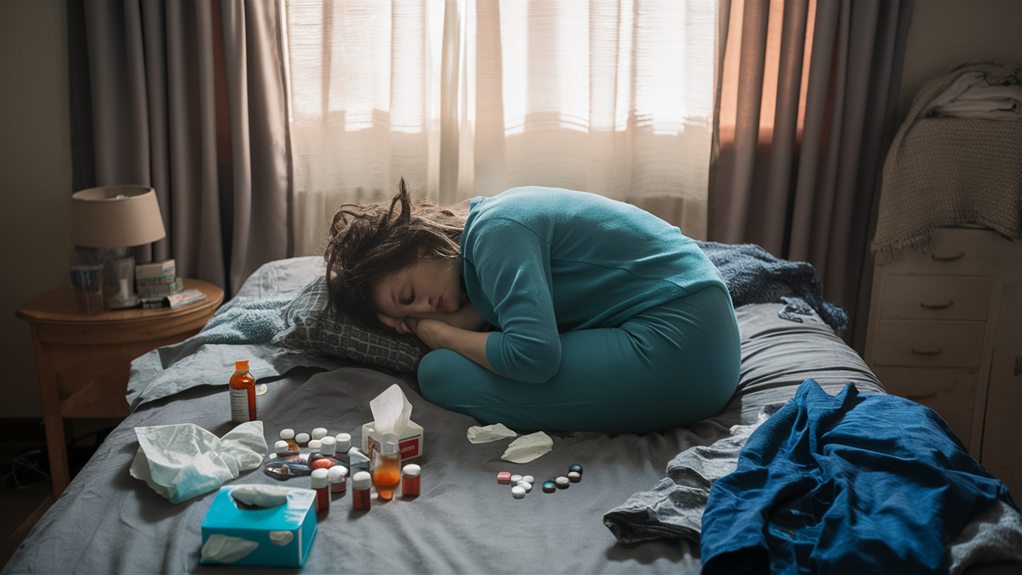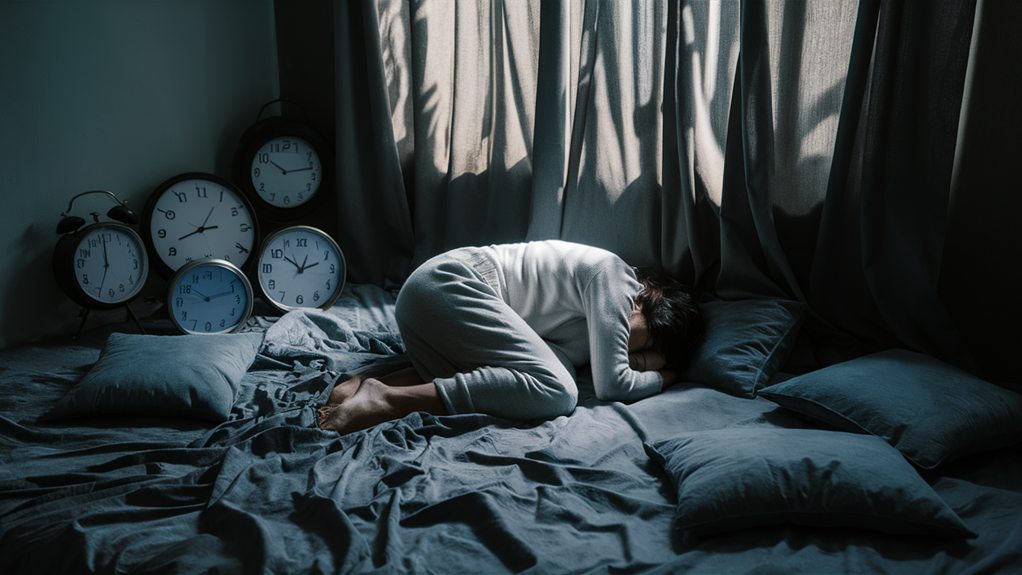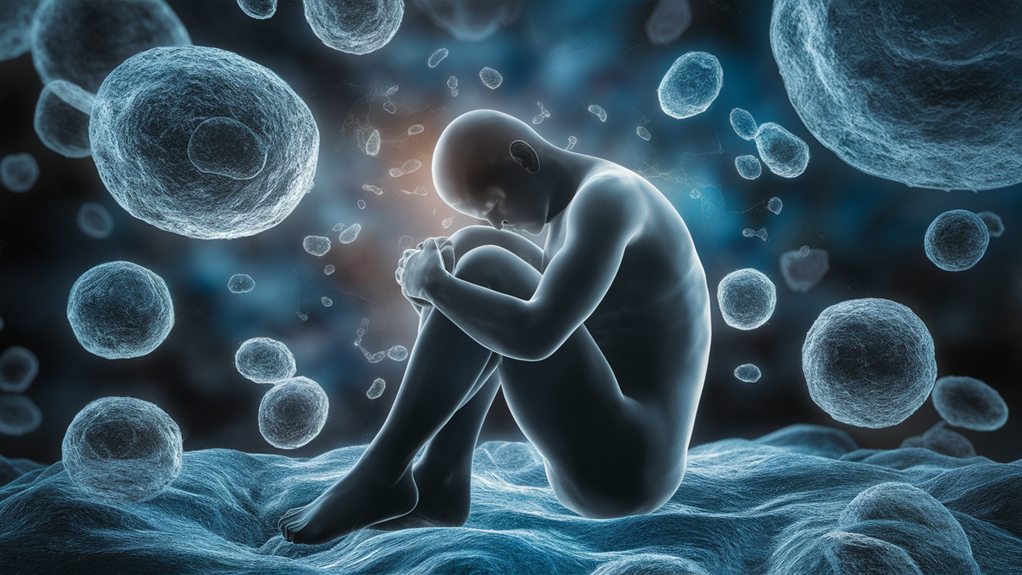Depression isn't just a mental health condition; it deeply affects your physical well-being in numerous ways. You'll notice changes in your sleep patterns, appetite, and energy levels, while your body may experience unexplained aches, muscle tension, and digestive issues. Depression can weaken your immune system, making you more susceptible to illnesses, and it's closely linked to heart health through increased stress hormones and blood pressure. Your eating habits might shift dramatically, either increasing or decreasing your appetite, which can impact your weight and nutrition. The connection between your mind and body runs deep, and understanding these physical symptoms is essential for your overall health journey.
Understanding Depression's Physical Symptoms

Beyond its emotional toll, depression manifests through numerous physical symptoms that many people don't recognize. When you're experiencing depression, your body responds in various ways that can markedly impact your physical health and well-being.
For instance, individuals with depression may also grapple with anxiety disorders, which can exacerbate physical symptoms like fatigue and muscle tension, as evidenced in understanding anxiety disorders. You might notice changes in your sleep patterns, whether it's struggling to fall asleep or sleeping too much, and these disruptions can leave you feeling constantly fatigued.
Depression-related conditions often include unexplained aches and pains, especially in your joints and muscles. You'll likely experience changes in your appetite and digestion, which can lead to weight fluctuations and stomach problems.
Your immune system may become compromised, making you more susceptible to colds and infections. Physical health and depression are closely intertwined, creating a cycle where each aspect influences the other.
You might notice your movements becoming slower, your energy levels dropping, and even your posture changing as depression affects your physical health. These symptoms aren't just in your head – they're real, physical manifestations of how depression impacts your entire body, and understanding them is essential for recognizing when you need help.
Heart Health and Mental Wellness
Three major connections link depression and heart health, making this relationship significant to understand.
First, when you're experiencing depression, your body produces stress hormones that can raise your blood pressure and heart rate, putting extra strain on your cardiovascular system. Additionally, maintaining a heart-healthy diet is vital, as certain foods can help mitigate some of the adverse effects of stress on the heart.
Second, you're more likely to develop unhealthy coping habits, like smoking or overeating, which directly impact your heart's wellbeing.
The third connection involves how depression affects your ability to manage chronic illness, especially heart disease. You might find it harder to take medications regularly, follow exercise routines, or maintain a heart-healthy diet when you're struggling with depression.
This creates a challenging cycle, as heart problems can worsen your depression symptoms, and depression can make heart problems more severe.
Understanding these connections can help you take better care of both your mental and physical health. If you're dealing with depression, it's important to tell your healthcare provider about any heart-related symptoms you're experiencing, such as chest pain, irregular heartbeat, or unusual fatigue.
They'll work with you to develop a treatment plan that addresses both conditions.
Sleep Patterns and Depression

Sleep and heart health share a deep connection when it comes to depression, with disrupted sleep patterns often serving as both a symptom and amplifier of depressive episodes.
When you're experiencing depression, you'll often notice changes in how you sleep, whether it's sleeping too much or struggling to fall asleep at all. These disruptions can create a challenging cycle, as poor sleep makes your depression worse, and worsening depression further impacts your sleep.
You might find yourself dealing with common sleep issues like waking up throughout the night, having trouble getting out of bed in the morning, or experiencing vivid, unsettling dreams.
Your body's natural sleep-wake cycle, or circadian rhythm, can become severely disrupted, making it harder to maintain a regular schedule. This disruption affects your body's production of important hormones like melatonin and serotonin, which help regulate both your mood and sleep patterns.
If you're noticing these changes in your sleep habits, it's important to understand that they're a natural part of depression, but they don't have to be permanent.
Working with healthcare providers can help you develop strategies to improve both your sleep quality and mental health.
Chronic Pain Connections
Depression and chronic pain create a complex, intertwined relationship that can greatly impact your daily life. When you're dealing with persistent pain, whether it's back problems, arthritis, or other conditions, you'll often notice your mood dropping considerably.
Incorporating anti-inflammatory foods into your diet may help reduce inflammation, which can play a role in both pain and depressive symptoms. Similarly, when you're experiencing depression, your body becomes more sensitive to physical discomfort, and you'll likely feel pain more intensely.
You might find yourself caught in a difficult cycle, where your pain makes your depression worse, and your depression amplifies your pain sensitivity. This connection happens because both conditions affect similar chemical messengers in your brain, particularly serotonin and norepinephrine.
When you're struggling with chronic pain, you'll typically experience changes in your sleep patterns, energy levels, and physical activity, which can trigger or worsen depressive symptoms.
It's important to understand that treating one condition often helps with the other, and you'll need to address both issues for the best results. Your healthcare provider can work with you to develop a thorough treatment plan that might include medication, physical therapy, counseling, or other approaches that target both your pain and depression.
Immune System Effects

While battling depression, your immune system often takes a significant hit, making you more susceptible to infections and illness. Your body's natural defense mechanisms become compromised when you're dealing with ongoing mental health challenges, and this connection between your mind and immune response is stronger than you might think.
When you're experiencing depression, your body undergoes several immune system changes that can affect your overall health. Here's what happens to your immune function:
- Your white blood cell production slows down, leaving you with fewer immune cells to fight off invading germs.
- Your inflammatory response increases, which can lead to chronic inflammation throughout your body.
- Your body produces more stress hormones, like cortisol, which suppress immune function.
- Your natural killer cells become less effective at identifying and destroying harmful substances.
You'll notice that you're catching colds more frequently, wounds take longer to heal, and you're experiencing more frequent infections.
That's why it's essential to work with your healthcare provider to address both your depression and immune health together, as they're closely interconnected and influence each other's severity.
Weight and Appetite Changes
Many people who struggle with depression experience considerable changes in their weight and eating patterns – and these shifts can swing dramatically in either direction. You might find yourself eating much more than usual, turning to food for comfort or eating mindlessly while feeling emotionally numb.
On the flip side, you could lose your appetite completely, forgetting to eat or finding that food has lost its appeal. Incorporating calming, nutrient-dense foods into your diet can help mitigate these effects, as certain foods have been shown to support mental health and reduce anxiety foods to calm anxiety naturally.
When you're depressed, your body's stress hormones can affect your metabolism, making it harder to maintain a healthy weight even if you're trying to eat normally.
You'll notice that these changes often create a challenging cycle, as poor nutrition can worsen your depression symptoms, making it even harder to regulate your eating habits. If you're experiencing increased appetite, you might crave carbohydrates and sugary foods specifically, while decreased appetite often comes with a lack of energy to prepare meals or even grocery shop.
These changes aren't just about willpower – they're real physical symptoms of depression that can considerably impact your overall health and require professional support to address effectively.
Treatment Impact on Physical Recovery

Successfully treating depression often involves a combination of therapeutic approaches that can positively influence your physical well-being. Regular exercise can play a significant role in this process, as it has been shown to reduce stress and anxiety, contributing to overall mental health improvements the stress-relieving benefits of exercise.
When you're working with healthcare providers to manage depression, you'll likely notice improvements in your physical health as your mental health gets better.
The connection between depression treatment and physical recovery is clear, and you'll often see progress in multiple areas:
- Your sleep patterns will typically improve first, helping your body restore its natural rhythms and energy levels.
- Your appetite and digestion will start to normalize, making it easier to maintain a healthy weight and get proper nutrition.
- Your immune system will become stronger, helping you fight off common illnesses more effectively.
- Your energy levels will gradually increase, making it easier to stay active and maintain exercise routines.
As you continue with your treatment plan, whether it's medication, therapy, or both, you'll notice these physical improvements happening gradually.
It's important to track these changes and share them with your healthcare provider, as they're valuable indicators that your treatment is working.



